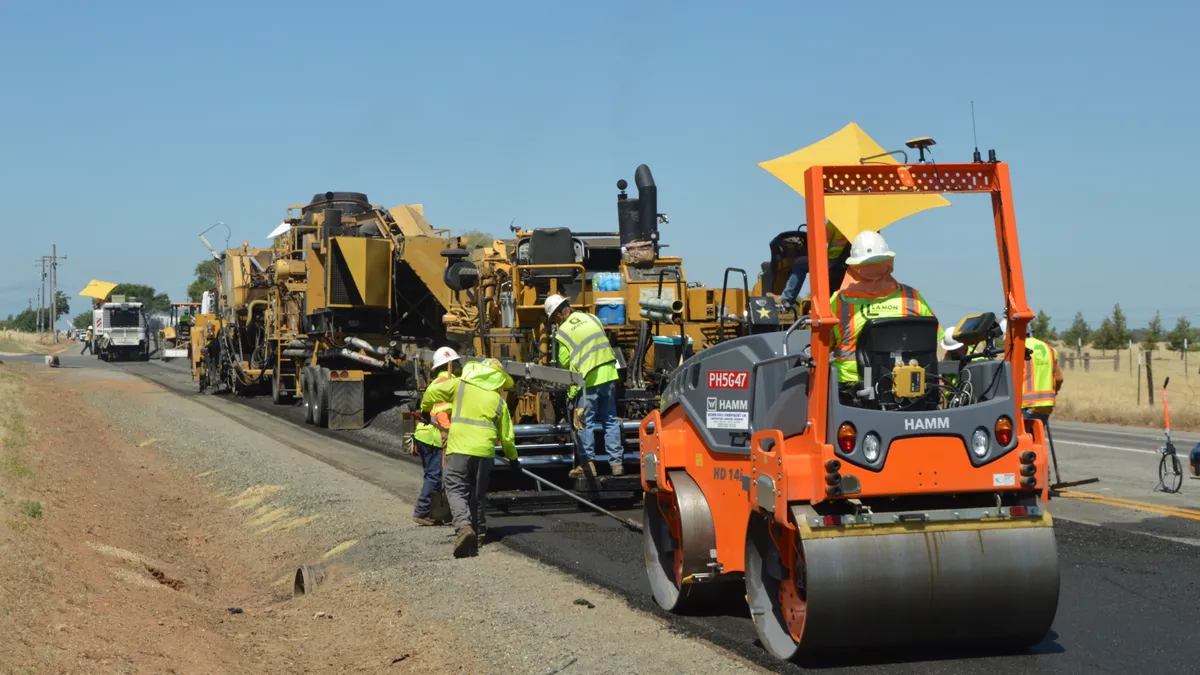Dive Brief:
- The California Department of Transportation (Caltrans) incorporated a binding agent made from old plastic bottles to repave a 1,000-foot, three-lane stretch of highway this summer during a pilot to test the material, according to a department release.
- Caltrans employed Redding, California-based TechniSoil Industrial’s G5 polymer binder. The material, which incorporates about 150,000 polyethylene terephthalate (PET) plastic bottles for every mile of pavement laid down, enables same-day, 100% onsite recycling of existing asphalt roads at ambient temperature, and produces a new surface that has the strength of concrete but the flexibility of asphalt, according to the company's website.
- The pilot, conducted on Highway 162 near Oroville, marks the first time Caltrans has paved a road using 100% recycled materials. Caltrans is using the $3.2 million paving project, headed by Yuba City, California-based Lamon Construction Co., as a proving ground for the material before deploying it on roads throughout the state.
Dive Insight
If Caltrans’ pilot using recycled plastic bottles proves successful, it could be a boon for both environmentalists and road builders.
On a traditional resurfacing project, road crews remove the top 3 to 6 inches of an existing road, grind it up and mix it with bitumen, a foamed binding agent left over from the oil refining process. But the resulting material is only strong enough to use as a new roadway base, and contractors still have to truck in hot-mix asphalt for the new road surface, while hauling up to half of the old road material away.
TechniSoil’s process is different, because it uses a recycling train of equipment to scrape off and grind up the top 3 inches of pavement and mix it with the G5 binding agent at ambient temperature before laying it back down and paving over it. The combination produces a product that has proven to be more durable than traditional asphalt, and last two to three times longer, according to the company.
That means future resurfacing projects could be self-contained on site, using only the existing road material and the binding agent to produce a brand new lane surface. Doing so would result in a 50% lifecycle savings to taxpayers, TechniSoil claims.
The combination of plastic recycling and reduced resurfacing costs could be attractive in other states as well, where infrastructure projects have been slashed or put on hold since the outbreak of the COVID-19 pandemic.
But waste experts say the road ahead for TechniSoil isn’t a straight shot. That’s because PET bottles, which use type 1 and 2 plastics, are in high demand by both beverage companies that want to recycle them, as well as carpet and clothing makers, who also use them in their products, according to USA Today.
TechniSoil president Sean Weaver told the newspaper the firm was exploring ways to use type 3-7 plastics, which have seen a glut on the market since China stopped accepting them last year.
“The recycled plastic part of this is awesome,” Weaver told USA Today. “But before I even cared about recycled plastic, we were looking at a technology that was going to recycle 100% of the road. The holy grail of the road construction industry has been to find a way to recycle 100% of the road stronger than the original road. That’s what we did.”












